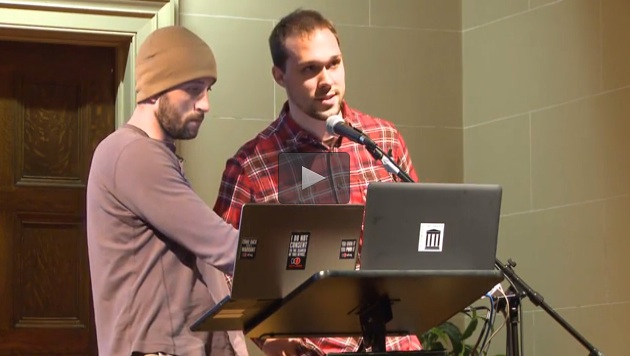August 22, 2014 – Lessig’s Mayday Super PAC stunned the political world by raising $7 million to fight corruption. Now comes the hard part: using money in politics to kick money out of politics. Lessig returns to the show to bring us inside the battle.
Monthly Archives: August 2014
How Universities Can Lead The Way For Legal Reform and Protection of Student Innovators
This article sets out a straight forward plan for how universities can support student innovation and protect their students from unnecessary prosecution (see very bottom of this post).
Students Who Push Tech Boundaries Should Be Encouraged, Not Punished
By April Glaser for Wired
From the article:
Notably, after faculty members and students circulated an open letter, MIT President Rafael Reif announced plans to support the Tidbit innovators, and MIT sent a formal letter to New Jersey’s Attorney General, asking it to withdraw the subpoena. The open letter stated that the subpoena from the New Jersey Attorney General will have, “a chilling effect on MIT teaching and research.” Soon after, MIT faculty and MIT students wrote additional letters of support, asking New Jersey to withdraw the subpoena. Over 800 members of the MIT community signed onto these letters.
President Reif appears to get it. In response to the outcry over the Tidbit controversy, Reif announced that MIT plans to create a new legal resource for students threatened by legal challenges as a result of their innovative work and entrepreneurial pursuits. “In the case of someone creating an innovative new product and then getting into legal trouble doing something that was a part of their classwork — then, MIT absolutely does have a legal interest to be involved,” Ethan Zuckerman, director of MIT’s Center for Civic Media, told the press.
Also from the article:
Now is the time for students and campus communities that want to vitalize innovation to speak up and demand university support. There are some simple steps that universities can take to foster inventiveness in their campus communities:
1. Create a legal intake mechanism or program for students who receive subpoenas and are threatened by computer crime laws. Student innovators need to know where to go to receive help.
2. Publish a guide on CFAA and in-state computer crime laws so that students and researchers can better understand the contours of the laws that may be leveraged against them.
3. Universities should be pushing for computer crime legal reform and come out with strong institutional support for reform efforts on the federal and state level.
Just as laws are frequently outdated by the accelerated pace of technology, campus policies often lag behind in addressing the potential legal needs of their most innovative students exploring the frontiers of digital invention. Yet universities don’t have to move at the slothful pace of legal change.
SecureDrop’s Garrett Robinson and James Dolan – At Aaron Swartz Day 2013

SecureDrop is an open-source whistleblower submission system managed by Freedom of the Press Foundation that media organizations use to securely accept documents from anonymous sources. It was originally coded by the late Aaron Swartz.
The goal of SecureDrop is to simplify the process of using Tor and an airgapped computer viewing station (decrypted with a private key) to protect the identity of a whistleblower uploading documents.
(From video) Garrett Robinson:
“The impetus behind SecureDrop is that we (FPF) want to restore the balance between governments and journalists who want to communicate with anonymous sources. Historically, the U.S. has had really strong press freedoms. This is essential for a functioning democracy.”
Main page:
https://pressfreedomfoundation.org/securedrop
Project page on Github:
https://github.com/freedomofpress/securedrop/
Form to fill out to request help with SecureDrop:
https://pressfreedomfoundation.org/securedrop#contact
SecureDrop Development List:
https://lists.riseup.net/www/info/securedrop-dev
SecureDrop FAQ:
https://pressfreedomfoundation.org/securedrop#faq
SecureDrop User Manual:
https://github.com/freedomofpress/securedrop/blob/develop/docs/user_manual.md